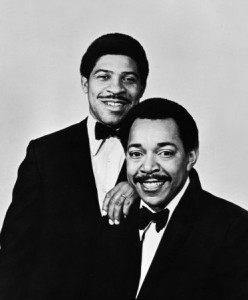 In August of last year I wrote about the Ramsey Lewis Trio, and their 1965 hit, “The ‘In’ Crowd.” In addition to pianist Lewis, the trio included bass player Eldee Young, and drummer Redd Holt. The single was a huge hit, and the album it came from, recorded live at Bohemian Caverns in Washington, D.C., was a Grammy award-winner.
In August of last year I wrote about the Ramsey Lewis Trio, and their 1965 hit, “The ‘In’ Crowd.” In addition to pianist Lewis, the trio included bass player Eldee Young, and drummer Redd Holt. The single was a huge hit, and the album it came from, recorded live at Bohemian Caverns in Washington, D.C., was a Grammy award-winner.
I have no particular insight into what happened, whether it was adversarial, or simply two musicians trying to make a name for themselves, but the following year Young and Holt left Lewis, and formed their own group, the Young-Holt Trio. Lewis soldiered on however. In fact, one of the replacements he brought in was Maurice White, who eventually founded the juggernaut that was Earth, Wind & Fire.
So what happened to Young and Holt and their new group? Well they did pretty well for themselves too. They pair had actually met when they were both attending the American Conservatory of Music in Chicago. They joined a dance band called the Cleffs, which is where they met Ramsey Lewis. They were to spend a decade as part of his trio.
Upon their departure, Young and Holt brought in a piano player by the name of Don Walker, and called themselves the Young-Holt Trio. It didn’t take long for the new trio to find success. Almost immediately they hit the Top 20 on the R&B chart with silly but infectious “Wack, Wack,” on Brunswick Records. The record also reached the Top 40 on the Billboard Hot 100.

By 1968, the trio had modified their name to Young-Holt Unlimited, and brought in Ken Chaney to play piano after Walker’s departure. It was with that lineup, and under that name that they scored their biggest hit. “Soulful Strut” rocketed all the way to #3 on the Billboard Hot 100, sold a million copies, and was awarded a gold disc by the RIAA.
The odd thing is that the song was first recorded by Barbara Acklin under the title “Am I the Same Girl,” and released in early 1969. Carl Davis was the producer, and he had the idea of removing Acklin’s voice from the recording, and replacing it with a piano solo by Floyd Morris. And here’s where the story gets really unusual. In addition to Morris, the backing track includes studio musicians. The widely held belief is that neither Young or Holt played on their biggest hit.
Although recorded first, Acklin’s vocal version was released in February, 1969, four months after the Young-Holt instrumental was released. Acklin’s record made a respectable showing, Top 40 on the R&B chart, and Top 100 on the Pop chart. Dusty Springfield had a minor hit with the song later that year, and Swing Out Sister’s 1992 remake did well on the international charts, and made the Top 50 in the U.S.
As for Young-Holt Unlimited, nothing they did from that point on lit the same kind of spark as “Soulful Strut,” with its unforgettable horn riff. They were popular on the jazz and R&B touring scene though, bringing in yet another pianist when Bobby Lyle subbed at times for Chaney. But two albums in the early ’70s failed to garner much attention, and they disbanded in 1974.
We’ll probably never know for sure whether Young and Holt played on their biggest hit. Eldee Young died in 2007, and no one else is talking. But no matter who played on the record, it remains one of the most beloved soul music instrumentals in the history of the genre.





Comments